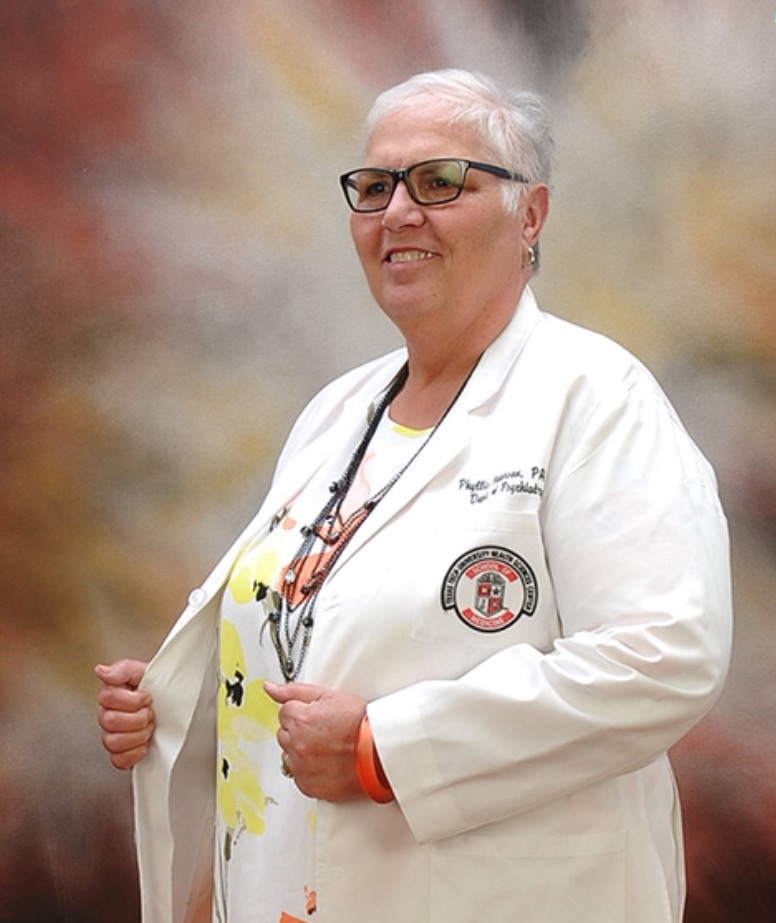Phyllis Peterson, MPAS, PA-C, Contributes to Clinical Support for Serious Mental Illness
August 26, 2020
By Eileen Denne, CAE, APR

As awareness of the need to support patients with serious mental illness (SMI) has increased, so has AAPA’s participation in initiatives to help address the issue. AAPA is represented on the advisory board of SMI Adviser, formed to support clinical care, by Phyllis R. Peterson, MPAS, PA-C. Peterson recently retired as associate faculty at Texas Tech University Health Sciences Center Psychiatry Department and works part-time in an ambulatory practice.
In July 2018, the American Psychiatric Association (APA) was awarded a five-year, $14.2 million grant from the Substance Abuse and Mental Health Services Administration (SAMHSA) to establish a clinical support system for SMI. The APA leads a team of experts and organizations to work on the project. SMI Adviser’s mission is to advance the use of a person-centered approach to care that ensures people who have SMI find the treatment and support they need. For clinicians, SMI offers access to education, data, and consultations to help support evidence-based treatment decisions.
Right credentials as liaison
Peterson has just the right credentials to fill the role. She has been practicing medicine since 1980 and provided mental healthcare in a wide variety of settings — a correctional facility, her community, a state hospital, and an academic medical center. This has given her a broad understanding of the systems and problems the psychiatric community faces. While at the Department of Psychiatry at Texas Tech University Health Sciences Center (TTUHSC), she provided outpatient evaluation and treatment of adult patients, telepsychiatry services, and inpatient consultation. She also precepted PA students, and taught and mentored PAs and nurse practitioners enrolled in TTUHSC’s postgraduate psychiatry program. Peterson worked closely with department chair, Terry C. McMahon, MD, and served on the TTUHSC Performance Improvement Committee and the Telemedicine Champion’s Group.
In addition, she was AAPA’s first board-appointed PA liaison to the American Psychiatric Association and served until June 2020. She is also a co-founder and current president of the Association of PAs in Psychiatry.
[Learn more about PA member benefits]
Improved understanding of PAs
According to Peterson, involvement with APA as liaison and then with the SMI Adviser initiative has helped to improve understanding of PAs. It has also highlighted how PAs in primary care, EM and, to a lesser extent, all specialties of medicine, have seen and met an increasing need to provide direct mental health care. They bridge care from primary to specialty settings, as well as provide crisis care.
“As liaison to the American Psychiatric Association, I have focused on talking informally to attendees at the APA annual meeting. I have been able to share information about PA education, clinical experience, and on Optimal Team Practice. In formal and informal meetings, I try to focus on correcting misconceptions about PAs, barriers to more utilization in psychiatry, and PA history of filling gaps in need since our inception in 1967,” Peterson says.
SMI Advisory app a must
SMI Advisor has and continues to develop and make available free consultations/questions, a knowledge base in psychiatry, CME, evidenced-based practice resources, information on SAMSHA initiatives, and Mental Health scales accessible on the SMI Advisor app, which Peterson says she reads like most people read Twitter or Facebook. She strongly recommends the app as a standard resource for those interested in helping patients with SMI.
Peterson says a major problem faced by the mental health community, healthcare education, and delivery systems is a way to alleviate the shortage of prescribing psychiatric providers. By developing interdisciplinary training for primary care PAs with medical students, Peterson feels that PAs can better contribute to mental health care delivery and related workforce issues. She worked with Texas Tech University Student Wellness to develop an integrated practice for delivery of primary care and specialty psychiatric care using a patient-centered approach.
Mental health access to care has remained a growing problem over the past two to three decades, she contends. “There are severe shortages of providers as well as inpatient beds with long wait times in EM and for ambulatory care, thus more is left to urgent care, primary care, and EM. It is imperative that PAs become a part of the solution.”
Many mental health resources available to PAs
Peterson points out that there are many resources for obtaining more information about mental health and psychiatry. Many state psychiatric organizations, universities, rural health organizations, and APA offer CME. Online sites include MD Linx, www.psychiatry.org and psychopharmacology institute. In addition, private companies like Psych Congress, (endorsed by APAP) and Neuroscience Education Institute have excellent CME several times per year. Catherine Judd, MS, PA-C, CAQ-PSY, DFAAPA, is on the Steering Committee for Psych Congress, September 10-13, 2020, in Nashville, Tennessee.
AAPA lists SMI webinars and CME and the Association of PAs in Psychiatry (currently free) is growing its resource listings and developing a career mapping center for PAs who want to transition or to gain more knowledge in psychiatry. Visit psychpa.com to join and learn.
Editor’s note: This article originally appeared in January 2020.
More Resources
Association of PAs in Psychiatry
For Clinicians: SMI Adviser
Eileen Denne is director of corporate communications at AAPA. Contact her at [email protected].
Thank you for reading AAPA’s News Central
You have 2 articles left this month. Create a free account to read more stories, or become a member for more access to exclusive benefits! Already have an account? Log in.



